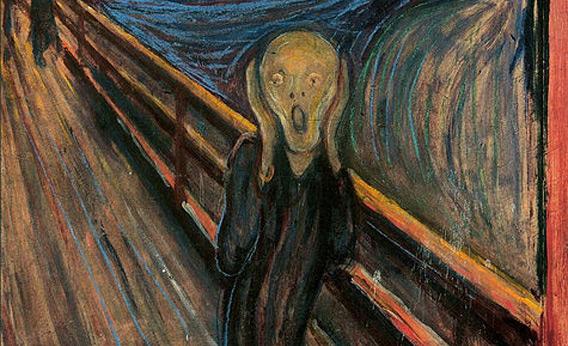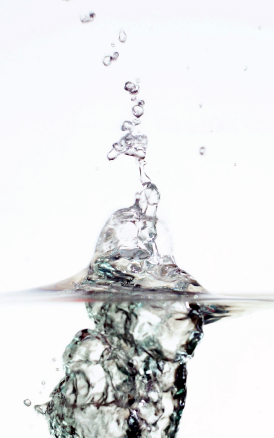Spring, Summer, Winter, Fall. Who’s the luckiest of all?
[‘Painting: Quattro Stagioni (Four Seasons) – CY Twombly, 1993-94.]
Menopause is seasonal?!!!
I’m as surprised as you. And as a May baby, I have a lot to think about.
According to research published several years ago in Menopause journal, there may actually be a connection between season of birth and certain symptoms that occur during menopause.
Now, before you think I’ve truly lost my marbles, let me share that data have previously connected season of birth to fetal growth rates, human life span, fertility, and even timing of menopause. The season in which we’re born have also been connected to the prevalence of mental health conditions, like schizophrenia, and bipolar disorder. And, according to Italian researchers (who performed analyses on 2,451 women attending menopause clinics) scientific scores taken at the time they sought advice actually connected birth season to their symptoms.
The goal of the scale was to measure factors like vasomotor symptoms (flashes, night sweats), psychological conditions (anxiety, depression) and bodily complaints (such as sleep issues or joint pain). Just to be sure that other factors were not influencing the results, factors, for example, that can influence symptoms such as smoking, number of years since menopause and BMI, they made additional scientific adjustments. The results?
If you are an Autumn baby, you may be in luck! Women born during the Fall months were found to be less likely to have psychological issues and fewer bodily complaints. Born in Spring? Not so lucky! In fact, converse to their Fall peers, women born in Spring had the highest scores for psychological and bodily complaints. If you were born during Summer or Winter, you may just win the balance lottery; it appears that these women just fell into the middle range of scores for these complaints. That’s the more general information. But how about actual month? The lowest overall scores were found among women born in November and the highest, among women born in June. For those of you who are astrologically inclined, the Scorpio/Sags are less likely to have psychological complaints than their Taurus/Gemini friends (i.e. November and May). November actually won the trifecta, as these women, again, had the lowest bodily complaint scores while March babies had the highest.
Mind you, the results are not the gospel; the researchers were evaluating data that had already been collected on a group of women seeking advice for symptoms. So there may have been bias to begin with. Still, it’s pretty interesting. I am a firm believer that humans are influenced and affected by the tides and the lunar cycles. Why not the seasons too?
But then again, as a May baby, I may actually be completely out of my mind! What about you? When were you born and how are your symptoms?
Read More
The gift of a lifetime…
I’ve been on a bit of a personal rage lately – a rage about weight gain and the ‘pause.
No time like the present to give yourselves the gift of a lifetime: aim for a healthy weight before you hit menopause.
We’ve discussed it time and again on Flashfree; weight gain and menopause go hand in hand like a horse and carriage. And with that weight gains comes an increased risk for developing heart disease, diabetes and the dreaded metabolic syndrome. However, last year, researchers from the University of Ottawa reported that entering full menopause with a healthy body mass index (BMI) actually confers protection.
In the study (which appeared online in the journal Menopause), researchers evaluated and observed 102 premenopausal women for body composition and changes in their cardiovascular health profiles. The women, all of whom were between 47 and 55 years of age, did not smoke, had a BMI between 20 and 29 and had had a stable weight for at least 6 months before the study started, were followed for five years. Each year, the researchers gauged if they had entered menopause, measured body composition (i.e. total fat mass, trunk fat mass and total fat free mass), waist size, the degree of abdominal fat and took blood to examine glucose, insulin and blood fat levels.
The study’s lead researcher, Dr. Denis Prud-homme explains that by simply observing the women and not imposing any structured interventions (e.g. diet or exercise) they were able to assess changes within a more naturalistic environment. At the study’s end, they discovered that despite significant increases in fat mass, visceral abdominal fat, blood glucose and cholesterol levels, most of which were the natural result of hormone fluctuations and aging, the women did not appear to have any declines in their heart or metabolic profiles that would indicate an increased risk for disease. Dr. Prud-homme says that a possible explanation might be that “even if the area of visceral fat is increased, it is still under the critical threshold associated with cardio-metabolic deterioration.” In other words, by maintaing a healthy lifestyle and BMI premenopausally, these women were able to change their risk equations once they fully entered menopause.
The bottom line is that the present you give yourself now will last long into your later years. Exercise. Eat right. And pay attention to your health.
No time like the present. For a present. Give yourself one.
Read MoreMonday Musings: The More Things Change
The Scream. Edvard Munch 1895.
The ‘Change.’ A time for ‘hysteria.’
I kid you not.
All joking aside, if you trace the history of the menopause, it has long been associated with loss, decline and decay, something is abhorred and shunned in society. And as I wrote earlier this year, in “response, marketers and the media have perpetuated and pathologized what author Louise Foxcroft (in her book, ‘Hot Flushes, Cold Science’) refers to as “one more feature in a woman’s linear life history, an inevitable and natural phenomenon, one more thing to negotiate and nowhere near as astonishing or potentially problematic as pregnancy.”
Even the British Medical Journal has been in the game, publishing a piece in 1937 that highlights how profound an impact the ‘Change’ can have a woman’s ability to function:
“Practically every menopausal woman becomes aware of certain mental clumsiness, an inability to cope with the ordinary problems of daily life, and a tendency to “give in.” The realization of her shortcomings is worrying, and she readily becomes depressed. Emotional instability is well defined, and the patient reacts to trivial situations with rather surprising attacks of laughter or tears. She is subject to rapid and frequent changes of mood: at one moment she will be unbearably irritable, at the next, pathetically contrite. There may be marked changes in personality and severe attacks of mental depression, sometimes lasting for days, during which the patient may become suicidal. A condition of hypochondriasis, which is particularly distressing to those around her, may develop out of the complicated syndrome, even in the milder cases, and persist for the remainder of the patient’s life.”
No wonder pharmaceutical manufacturers started pushing thorazine and benzadrine.
If wandering around in a drugged out state doesn’t calm you down or pep you up, the general 1937 approach might. In fact, I am of the mindset that modern medicine may need to take a page from 1927 clinician Dr. PMF Bishop:
“Assistance can be rendered by the members of the patient’s household. Her husband and relatives should be told that she is passing through a difficult phase of life and that they should therefore be tolerant and sympathetic in their dealings with her. She should be shielded as much as possible from domestic worries, and sometimes a holiday away from her household duties is beneficial, thought i may be harmful if she is a woman of forceful personality who will worry over the conduct of her home in her absence. She should be encouraged to pursue any hobby which will prevent her from becoming introspective about her condition. She may suffer from a secret fear that her symptoms are due to cancer, and it is wise for her doctor to reassure her specifically on this point.”
So, what is the point of my Monday musing? Menopause is still viewed as an hysterical condition in many circles. The trouble is, the recommended solution is HRT (mind you, even Dr. Bishop writes about estrogen replacement) and rarely do practitioners recommend that the woman simply take a long holiday away from the stressors of her mind and body. Relaxation can help; I’ve shown you the data on Flashfree time and again.
Just think if someone could put THAT in a bottle.
Read More
Feeling wheezy? HRT may be that albatross around your neck…
Did you know that asthma affects an estimated 300 million people across the globe? That’s roughly one in 20 and it’s incidence is expected to rise over the next few years, especially in urban areas. However, did you also realize that researchers believe that there may be a connection between reproductive status, reproductive hormones and the development of asthma? In fact, while early on, asthma occurs in greater rates among boys than girls, this flips in puberty and by the time early adulthood hits, twice as many women as men suffer from asthma. As women start to age, however, the role of hormones is less clear, with some research showing that asthma rates decline through natural menopause, early or surgical menopause may be associated with greater risk.
Despite an extensive review of available studies, the evidence for the link between asthma and menopause remains limited, except among women who experienced early menopause and started using hormonal therapy. Take note that while this increased risk was minimal, it is in direct conflict with reports that claim that hormone therapy actually protects against asthma! Indeed, it is believed that low levels of estrogen may act to protect against the development of asthma while abnormally high levels, such as those created by exogenous hormones, can increase it. And it’s not the first time that I’ve come across this link (check out these earlier posts!). Additionally, it may be possible that women who go through early menopause may have hormonal imbalances that are linked to respiratory issues and illness.
Still, the association is unclear and it’s likely to factors other than gender and hormones also play a role in asthma, such as genetics and metabolism. In the meantime? Be mindful that replacing estrogen may not be the most natural pathway and perhaps, its decline, despite being associated with a myriad of troublesome symptoms like flashes, sweats and swings, is also protective.
If you are feeling wheezy and don’t take hormones, it’s probably not the ‘pause. If you are on hormone replacement and notice changes in your breathing, take pause and get yourself in to see a practitioner.
Read More
Wednesday Bubble: Eating your way through the ‘pause
I’ve written a lot about diet and maintaining a healthy weight , as well as impact on overall health as you age. And I will continue to do so as long as Flashfree is published. However, I have not written much on diet and how it affects symptoms, mostly because the evidence is pretty scant in that regard. Still, it has come up in conversations repeatedly and I feel that it’s time to at least broach the topic, especially since I discovered Dr. Akiko Sugahara, a Tokyo-based nutrition, anti-aging and women’s health specialist and her book, Menopause Recipes for Health and Beauty.
When it comes to maintaining health, obtaining minerals and vitamins through dietary sources is always preferable although not always possible. And while I cannot vouch for anything that Dr. Sugahara has shared in her book, her publicist did reach out with an offer to let me share a few pages here. Draw your own conclusions; we do know that not all soy products are created equal, and that isoflavone benefits may vary as well. Still, Dr. Sughara’s message is health comes first, which is why I chose this particular section to reprint in part. Please note that in her ebook, Dr. Sughara actually provides 10 ideas, which I have condensed for space purposes. If you want to read more, do download her book on her Facebook page.
Thank you Dr. Sughara, for providing your words to this post.
A deterioration in your physical condition during menopause renders you more vulnerable mentally. In this section, we present concrete ideas that will help you to manage menopause skillfully and improve your physical and mental health.
Taking a closer look at your everyday diet and identifying the problems.
Food preparation at home can sometimes fall below standard once the children have grown up. Before you know it, you might find yourself snacking instead of eating proper meals, eating lots of precooked meals and instant foods from your local supermarket or eating out more than you should. Where your diet is concerned, it is well worth making that extra effort for the sake of your own health and that of your family.
To identify potential problem areas, let’s first itemize your food balance.
Fermented soybean products more effective than supplements
The effectiveness of isoflavone in alleviating menopausal disorders is often discussed on television, and the link between soybeans and isoflavone is now common knowledge. Daily consumption of raw tofu, dried tofu, fermented soybeans, boiled beans or other soybean products is essential in treating and preventing menopausal disorders. Soybean milk, for example, is a convenient source of such also chill your body somewhat, so it is best consumed as an ingredient in stews and other hot dishes. Fermented foods, such as miso and vinegar, are more readily absorbed by the body and therefore provide isoflavone with a stronger effect.
Constipation relief as the basis for menopause relief
Many women with severe menopausal symptoms suffer from constipation. This condition also renders its sufferers more sensitive to the cold, often contaminating the blood and preventing it from flowing smoothly. This in turn reduces the amount of oxygen reaching the brain, making you absentminded and unable to organize your thoughts to get things done. Curing constipation therefore restores the blood flow to your extremities, bringing back the warmth to your hands and feet. The most effective cure for constipation is a diet of foods rich in isoflavone and polyphenols and especially dietary fibre, and sprouted brown rice is a prime example of these. Be wary of long-term use of medicinal laxatives, since they cause body chills that are felt deep inside your body.
Combating obesity with foods in 5 colours
Menopause is often accompanied by weight gain. Overeating to console loneliness is a primary cause, and a healthy digestive system will readily convert any excess intake into fat. This often results in a shortage of essential B- group vitamins, which promote complete combustion of nutrients and improve rain function, making it difficult to burn stored body fat. To combat weight gain, you should reduce your consumption of sweets and fruit and increase your consumption of stews made from as many as possible of the ingredients in the five basic colours. If you are susceptible to weight gain, then a staple of sprouted brown rice and wholegrain bread and an appropriate amount of exercise are recommended. This alone should eliminate obesity, helping menopausal symptoms to disappear naturally.
Dried foods effective for chills and abdominal ptosis
Many women who suffer from chills also have abdominal ptosis, or drooping of the viscera. This condition causes a deterioration in the secretion of gastric acid, preventing the essential absorption of iron and copper. It also causes the stomach to become bloated, so fatty foods lose their taste, and at the same time it restricts the consumption of plain foods. Consequently, some women skip breakfast or lunch or eat too little generally, resulting in a diet deficient in protein, iron and vitamins. To make things worse, the greater sensitivity to the cold that accompanies this condition can cause insomnia. The solution is to eat lots of shellfish, prunes and other dried fruits, cooked foods with iron and copper-rich whole-fish dishes and fried liver and vegetables. To compensate for the reduced amount of stomach acid, perhaps it would be a good idea to also eat foods containing vinegar and hot Chinese-style dishes with flavoured vinegar or to use pickled Japanese apricots in your cooking.
Idea 5: Combating osteoporosis with dried foods and fermented foods
Female hormones strengthen the bones to mitigate the effects of bone aging. As the secretion of female hormones declines, more bone cells are destroyed than are produced, and osteoporosis soon sets in, leaving the bones thinner and more porous and brittle. One way of dealing with osteoporosis is to include calcium-rich small fish, dried foods and fermented foods in your diet and to walk between 30 minutes and one hour every day. Another is to compensate for the decline in female hormones by eating plenty of isoflavone-rich foods such as miso soup and fermented soybeans to prevent body chills. Whenever possible, it is preferable to cure yourself using your own efforts rather than relying on yourdoctor.
Read More











